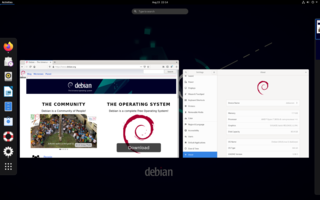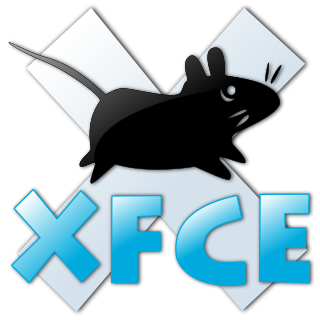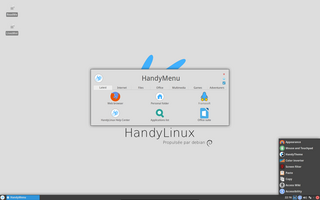
The Common Desktop Environment (CDE) is a desktop environment for Unix and OpenVMS, based on the Motif widget toolkit. It was part of the UNIX 98 Workstation Product Standard, and was for a long time the Unix desktop associated with commercial Unix workstations. It helped to influence early implementations of successor projects such as KDE and GNOME desktop environment, which largely replaced CDE following the turn of the century.

Debian, also known as Debian GNU/Linux, is a Linux distribution composed of free and open-source software, developed by the community-supported Debian Project, which was established by Ian Murdock on August 16, 1993. The first version of Debian (0.01) was released on September 15, 1993, and its first stable version (1.1) was released on June 17, 1996. The Debian Stable branch is the most popular edition for personal computers and servers. Debian is also the basis for many other distributions, most notably Ubuntu.

A Linux distribution is an operating system made from a software collection that includes the Linux kernel, and often a package management system. Linux users usually obtain their operating system by downloading one of the Linux distributions, which are available for a wide variety of systems ranging from embedded devices and personal computers to powerful supercomputers.

Xfce or XFCE is a free and open-source desktop environment for Linux and other Unix-like operating systems.

The Linux Standard Base (LSB) was a joint project by several Linux distributions under the organizational structure of the Linux Foundation to standardize the software system structure, including the Filesystem Hierarchy Standard. LSB was based on the POSIX specification, the Single UNIX Specification (SUS), and several other open standards, but extended them in certain areas.

A light-weight Linux distribution is one that uses lower memory and/or has less processor-speed requirements than a more "feature-rich" Linux distribution. The lower demands on hardware ideally result in a more responsive machine, and/or allow devices with fewer system resources to be used productively. The lower memory and/or processor-speed requirements are achieved by avoiding software bloat, i.e. by leaving out features that are perceived to have little or no practical use or advantage, or for which there is no or low demand.
Dependency hell is a colloquial term for the frustration of some software users who have installed software packages which have dependencies on specific versions of other software packages.

Ubuntu is a Linux distribution based on Debian and composed mostly of free and open-source software. Ubuntu is officially released in three editions: Desktop, Server, and Core for Internet of things devices and robots. All of the editions can run on a computer alone, or in a virtual machine. Ubuntu is a popular operating system for cloud computing, with support for OpenStack. Ubuntu's default desktop changed back from the in-house Unity to GNOME after nearly 6.5 years in 2017 upon the release of version 17.10.
Technical variations of Linux distributions include support for different hardware devices and systems or software package configurations. Organizational differences may be motivated by historical reasons. Other criteria include security, including how quickly security upgrades are available; ease of package management; and number of packages available.

FVWM95 is a window manager for the X Window System based on the popular FVWM 2 window manager. It is similar to the original FVWM, but is designed to closely resemble the look of Windows 95.

LXDE is a free desktop environment with comparatively low resource requirements. This makes it especially suitable for use on older or resource-constrained personal computers such as netbooks or system on a chip computers.

Linux Mint is a community-driven Linux distribution based on Ubuntu, bundled with a variety of free and open-source applications. It can provide full out-of-the-box multimedia support for those who choose to include proprietary software such as multimedia codecs.

The Haskell Platform is a collection of software packages, tools and libraries that create a common platform for using and developing applications in Haskell. With the Haskell Platform, Haskell follows the same principle as Python: "Batteries included". Since 2022, the Haskell Platform has been deprecated.

Kiwix is a free and open-source offline web browser created by Emmanuel Engelhart and Renaud Gaudin in 2007. It was first launched to allow offline access to Wikipedia, but has since expanded to include other projects from the Wikimedia Foundation, public domain texts from Project Gutenberg, many of the Stack Exchange sites, and many other resources. Available in more than 100 languages, Kiwix has been included in several high-profile projects, from smuggling operations in North Korea and encyclopedic access in Cuba to Google Impact Challenge's recipient Bibliothèques Sans Frontières.

Leafpad is a free and open-source graphical text editor for Linux, BSD, and Maemo that is similar to the Microsoft Windows program Notepad. Created with the focus of being a lightweight text editor with minimal dependencies, it is designed to be simple-to-use and easy-to-compile.

Zim is a graphical text editor designed to maintain a collection of locally stored wiki-pages, a personal wiki. Each wiki-page can contain things like text with simple formatting, links to other pages, attachments, and images. Additional plugins, such as an equation editor and spell-checker, are also available. The wiki-pages are stored in a folder structure in plain text files with wiki formatting. Zim can be used with the Getting Things Done method.

KDE Frameworks is a collection of libraries and software frameworks readily available to any Qt-based software stacks or applications on multiple operating systems. Featuring frequently needed functionality solutions like hardware integration, file format support, additional graphical control elements, plotting functions, and spell checking, the collection serves as technological foundation for KDE Plasma 5 and KDE Gear distributed under the GNU Lesser General Public License (LGPL).

HandyLinux is a simplified Linux operating system developed in France, derived from the Debian stable branch. It was designed to be easily accessible and downloadable, so that it could be used by people with very little computer experience and on a range of older hardware that was no longer supported by the latest versions of proprietary operating systems. It was particularly aimed at older people with dated hardware who do not need nor possess the skill to use many features afforded by state-of-the-art operating systems.

Q4OS is a light-weight Linux distribution, based on Debian, targeted as a replacement for operating systems that are no longer supported on outdated hardware. The distribution is known for being similar in appearance to Microsoft Windows operating systems with some of its pre-installed themes inspired by the look and feel of Windows 2000 and Windows XP.



















